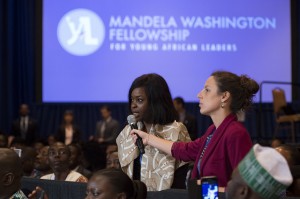“This will be part of everything that we do.”
In July 2014, President Obama hosted a Town Hall meeting for 500 Mandela Washington Fellows who had come to the United States as part of the U.S. government’s Young Africa Leaders Initiative (YALI). These are some of the best and brightest people between the ages of 25 and 35 on the African continent, and in the Town Hall meeting they did not shy away from challenging the president on how the United States could be a stronger partner with their countries.

Changu Siwawa, a young woman from Botswana, said to the president, “I just wanted to find out how committed is the United States to assisting Africa in closing gender inequalities, which are contributing to gender-based violence and threaten the achievement of many Millennium Development goals.” The president responded, “Everything we do, every program that we have—any education program that we have, any health program that we have, any small business or economic development program that we have, we will write into it a gender equality component to it. This is not just going to be some side note. This will be part of everything that we do.”
Changu Siwawa understands the connection between gender-based violence and hunger all too well. She is the Outreach Coordinator for the Kagisano Society Women’s Shelter in Botswana. When she asked the president about the U.S. commitment to help Africa in closing gender inequalities, she highlighted the need for U.S. development assistance to strengthen African countries’ efforts to end violence against women.
Local NGO capacity building is one of the most important ways for U.S. development assistance to support partner countries. It is up to people from the country and the cultures concerned to figure out how to end gender discrimination. No one else can, despite how ubiquitous gender inequality is around the world, because the inequalities are highly situation specific and embedded in culture. Thus, the United States can be a more effective partner with Botswana by providing support to build the capacity of institutions such as women’s shelters, schools, and government offices so that they are able to succeed in closing gender inequalities in their country.
The Kagisano Society Women’s Shelter is an example of how U.S. development assistance can support the building of such local capacity. The shelter is funded in part by the U.S. President’s Emergency Program for AIDS Relief (PEPFAR). Botswana has one of the highest HIV/AIDS rates in the world, and the web of connections among HIV/AIDS, sexual violence, and poverty is omnipresent there. PEPFAR supports the work of a Peace Corps volunteer at the Kagisano Society Women’s Shelter. Danielle Tuft has a master’s degree in public health and was placed at the shelter to work on capacity building. She assists Changu in outreach to children through school-based programs, developing a curriculum that gets primary- and middle-school students to reflect on the power relations they witness in their homes between mothers and fathers, and on how those relations are shaping their own experiences with the opposite sex.
U.S. government assistance has also provided technical support for the creation of a national database of victims of domestic violence, which Kagisano Society Women’s Shelter is using to identify people to refer to services such as health care and food assistance. U.S. development policy gives PEPFAR the flexibility to broaden its mandate to include disentangling the complicated web of connections among HIV/AIDS, gender-based violence, and hunger. U.S. assistance also provided a space for Changu and other young African leaders to come together in Washington, DC, where they founded a pan-African alliance against gender-based violence.
